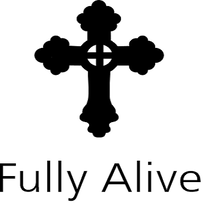The Life-Altering Choice We Can’t Weasel Our Way Out Of (Lenten Scriptural Commentary #38)4/12/2019 by Erik Ritland
"Although Jesus cried from the cross, “My God, my God, why hast thou forsaken me?” – an act in which God went to the depths of Godforsaken-ness so He could be one with those who feel the darkest Godforsaken-ness – His apparent failure was God’s ultimate plan." Fully Alive’s Lenten Scriptural Commentary helps Christians get more out of Lent by taking God’s word seriously. Mostly avoiding personal stories and anecdotes, our commentary dives deeply into the scripture readings for each day and applies them to the broader context of Lent. We use the daily Mass readings from the Catholic lectionary. If possible, read each passage slowly, taking in each word. If you find that you’ve hurried through a reading, read it over a few more times. Let the words reverberate in your heart. After you’ve let it sink in, read our Lenten Scriptural Commentary. Friday of the Fifth Week of Lent Words of the prophet Jeremiah look ahead to Holy Week, and Jesus continues to make His identity as the Son of God plain for all to see. Readings: Jer 20:10-13/Jn 10:31-42 Click here to read the complete text from the USCCB website I hear the whisperings of many: "Terror on every side! Denounce! let us denounce him!" All those who were my friends are on the watch for any misstep of mine. "Perhaps he will be trapped; then we can prevail, and take our vengeance on him." But the LORD is with me, like a mighty champion: my persecutors will stumble, they will not triumph. In their failure they will be put to utter shame, to lasting, unforgettable confusion. (cf Jer 20: 10-13) This is practically a commentary on Jesus’ passion, only it was written 600 years beforehand. Jesus’ friend, Judas, watched for His missteps, or at least His perceived missteps. The priests, scribes, and rabble all shouted: “Denounce! Let us denounce him! Perhaps we can prevail, and take our vengeance on him.” Although Jesus cried from the cross, “My God, my God, why hast thou forsaken me?” – an act in which God went to the depths of Godforsaken-ness so He could be one with those who feel the darkest Godforsaken-ness – His apparent failure was God’s ultimate plan. Those against Him did not triumph, and in their failure they were put to utter shame. “If I do not perform my Father's works, do not believe me; but if I perform them, even if you do not believe me, believe the works, so that you may realize and understand that the Father is in me and I am in the Father." (cf. Jn 10: 31-42) If the Father is not in Jesus, then He is a liar, He is deceived, He is a fraud. If the Father is in Jesus, however, then God’s work is ultimately fulfilled in Him. This is indeed an all-or-nothing proposition. No amount of pretty words or misguided universalism can cover up this fact. Scripture is clear, Church history is clear. Reason and scholarship point to it. We can’t weasel our way out of it: we each have to choose whether we accept Jesus or we don’t. Erik Ritland is a writer and musician. The founder of Fully Alive Christian Media, he also created The Minnesota Sport Ramble and is a writer and copy editor for Music in Minnesota. He was Lead Staff Writer for Minnesota culture blogs Curious North and Hometown Hustle. Reach him via email.
0 Comments
Leave a Reply. |
Authors
Erik Ritland received his MA in Theology in 2017. He's the founder and content manager of Fully Alive Christian Media and Rambling On, copy editor and writer for Music in Minnesota, and an acclaimed songwriter. Archives
April 2019
Categories |

 RSS Feed
RSS Feed
